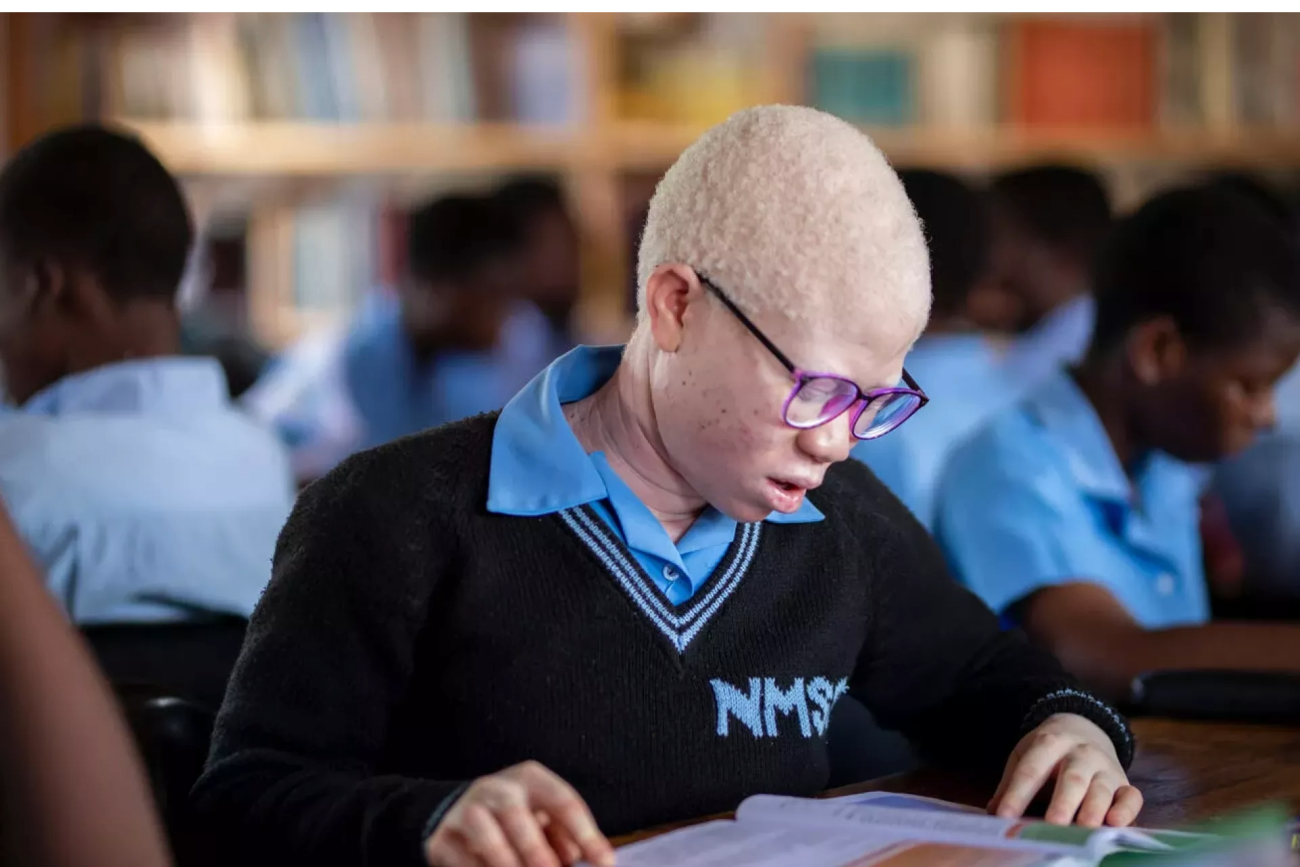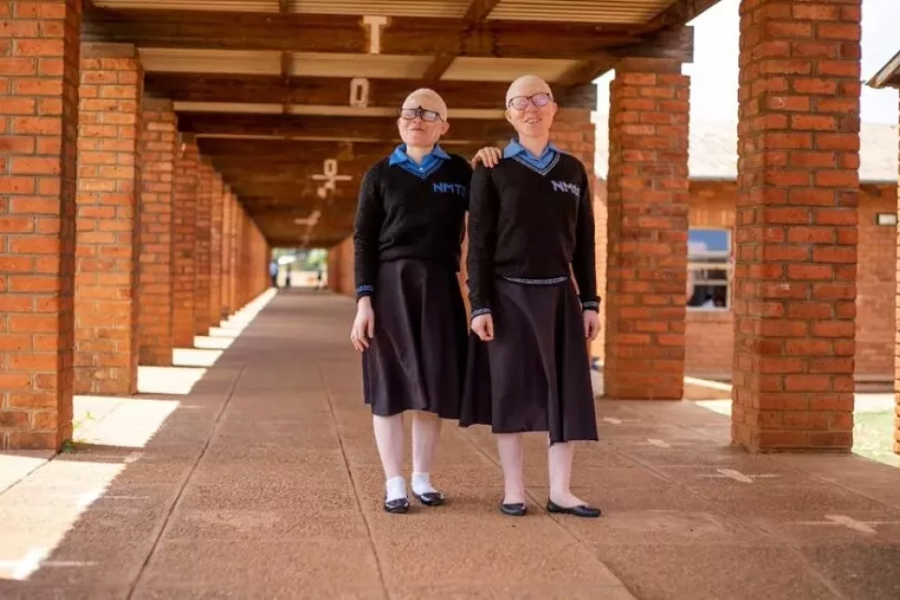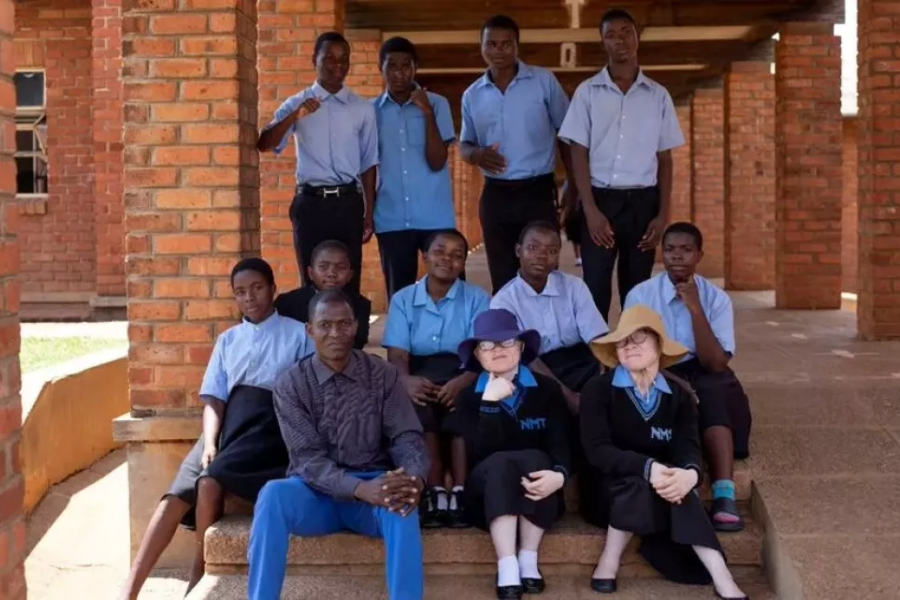Scholarship offers hope to children with albinism in rural Malawi

“It’s a lifeline to a future we could only dream of," Angella
Under the sweltering midday sun at Namitete Secondary School (NMSS) in rural Lilongwe, Angella Levison focuses intently on her end-of-term exams. Her determination is unwavering, a stark contrast to the despair she felt just a year ago.
Angella, who has albinism, almost gave up on her education last year due to financial struggles. “I was constantly called to see the head teacher about unpaid school fees. It was hard to concentrate in class,” she recalls.
But today, Angella sits in the exam room worry-free, thanks to a scholarship program by UNICEF with funding from the Kids in Need of Desks (KIND) Fund, a long-standing partnership between UNICEF USA and MSNBC that equips classrooms with desks and is offering scholarships to Malawian girls.
Since its launch in 2010, the program has delivered over 385,000 desks to primary students, reaching more than 1.5 million learners. It has also supported nearly 30,000 schoolgirls with scholarships to complete their secondary education.
For Angella, the scholarship covers her school fees, uniforms, learning materials, and other essentials until she completes secondary school.
“For the first time in my secondary school life, I have sat for exams without worrying about fees,” she says, her face lighting up with a smile.
Her younger sister, 15-year-old Ida Levison, also born with albinism, shares her joy.
“The scholarship has given us hope for a brighter future,” says Ida, who is also in Form Two. “I will work extra hard so that I achieve my goal.”

Children with albinism in Malawi face numerous challenges, including stigmatization, discrimination, and physical threats. Many struggle to access quality education due to financial constraints and societal barriers. Angella and Ida’s mother, a single parent, could not afford school fees, let alone other essentials like notebooks and uniforms.
“Lack of school fees and other basic necessities affected our performance in Form One,” says Ida. Without the scholarship, the sisters’ dreams of completing secondary school and pursuing careers would have been unobtainable.
The UNICEF scholarship program aims to bridge the gap for vulnerable learners, particularly girls and people living with disabilities. At NMSS, Angella and Ida are currently the only recipients, but the impact on their lives has been profound.
Their teacher, Luke Chinamale, has observed remarkable improvements in their academic performance and social behavior.
“After receiving the scholarship, I have seen an improvement in their concentration, mood towards learning, and interaction with peers,” he says. “Of late, we have seen a remarkable improvement in their class performance.”
However, Chinamale highlights the struggles faced by students without scholarships.
“Generally, their concentration in class is poor because they have to constantly think of ways to pay school fees. There are times we send them back home while their peers continue with studies,” he notes.
NMSS headteacher Hebert Mmala estimates that 100 of the school’s 658 students are struggling to pay the K160,000 ($94) annual school fees.
“Some parents try to pay in installments, but even that is a challenge. Many students have arrears from previous terms,” he says.
The school also enrolls 62 students living with disabilities, including seven with albinism. Mmala stresses that girls are disproportionately affected as they face additional challenges, such as the need for sanitary pads and extra care. “We wish we could have more scholarships to support these learners,” he appeals.

For Angella and Ida, the scholarship has rekindled hope and ambition.
“I want to become an accountant and help others who are struggling like us,” says Angella.
The scholarship program offers a beacon of hope, but the story of Angella and Ida underscores the need for sustained efforts to ensure that no child is left behind.
As Angella puts it, “This scholarship is more than just money. It’s a lifeline to a future we could only dream of.”




